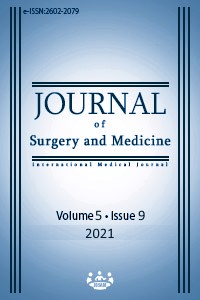Does vitamin D replacement therapy cause a regression in fatty liver disease? A case control study of comparison of vitamin D and other common therapy modalities
Keywords:
Fatty liver, Metformin, Vitamin DAbstract
Background/Aim: Non-alcoholic fatty liver is quite common among modern populations, and simpler methods are researched for its early diagnosis and therapy. Studies are stating that vitamin D deficiency could play a role in the etiopathogenesis of fatty liver. This study aimed to compare the efficacy of metformin and vitamin D therapy in improving fatty liver disease. Methods: A total of 86 patients with non-alcoholic fatty liver disease were included in this case control study and classified into four groups according to the treatment received. In the study group, 23 patients were using metformin only, and 21 patients were using both metformin and vitamin D. Twenty-one patients were using vitamin D only, and 21 patients were on a diet and an exercise regimen (control group). Weight, BMI, waist circumference, fatty liver index (FLI), HOMA-IR, AST, ALT, GGT, triglyceride parameters were evaluated before and after four weeks of therapy. Results: There was a significant regression in the fatty liver disease of the patients who used both metformin and vitamin D (FLI-%5, 90 (11.1) P=0.025). Among patients who used only metformin and only vitamin D, the decrease in FLI was not significant (P>0.05); however, FLI was observed to significantly decrease in the control group (-7.30, P=0.018). The serum CRP levels were also observed to significantly decrease in the control, Met and Met-D vit groups (P=0.025, P=0.002, P=0.006, respectively). Conclusions: The combination of vitamin D and metformin therapy could positively contribute to the improvement of NAFLD in patients with vitamin D deficiency.
Downloads
References
Caldwell SH, Oelsner DH, Iezzoni JC, Hespenheide EE, Battle EH, Driscoll CJ. Cryptogenic cirrhosis: clinical characterization and risk factors for underlying disease. Hepatology. 1999;29:664‐9.
Ludwig J, Viggiano TR, McGill DB, Oh BJ. Nonalcoholic steatohepatitis: Mayo Clinic experiences with a hitherto unnamed disease. Mayo Clin Proc. 1980;55:434-8.
Day CP, James OF. Steatohepatitis: a tale of two "hits"? Gastroenterology. 1998;114:842–5.
Stefan N, Kantartzis K, Machann J, Schick F, Thamer C, Rittig K, et al. Identification and characterization of metabolically benign obesity in humans. Arch Intern Med. 2008;168(15):1609–16
He L, Sabet A, Djedjos S, Miller R, Sun X, Hussain MA, et al. Metformin and insulin suppress hepatic gluconeogenesis through phosphorylation of CREB binding protein. Cell. 2009;137(4):635–46.
Turlin B, Mendler MH, Moirand R, Guyader D, Guillygomarc’h A, Deugnier Y. Histologic features of the liver in insulin resistance-associated iron overload. A study of 139 patients. Am J Clin Pathol. 2001;116:263.
Huypens P, Quartier E, Pipeleers D, Van De Casteele M. Metformin reduces adiponectin protein expression and release in 3T3‐L1 adipocytes involving activation of AMP activated protein kinase. Eur J Pharmacol. 2005;518:90– 5.
Lin HZ, Yang SQ, Chuckaree C, Kuhajda F, Ronnet G, Diehl AM. Metformin reverses fatty liver disease in obese, leptin deficient mice. Nat Med. 2000;6:998-1003.
Dasarathy J, Periyalwar P, Allampati S, Bhinder V, Hawkins C, Brandt P, et al. Hypovitaminosis D is associated with increased whole-body fat mass and greater severity of non-alcoholic fatty liver disease. Liver Int. 2014;34:118–27. doi: 10.1111/liv.12312.
Barchetta I, Angelico F, Ben MD, Baroni MG, Pozzili P, Morini S, et al. Strong association between non-alcoholic fatty liver disease (NAFLD) and low 25(OH) vitamin D levels in an adult population with normal serum liver enzymes. BMC Med. 2011;9:85.
Targher G, Bertolini L, Scala L, et al Associations between serum 25-hydroxyvitamin D3 concentrations and liver histology in patients with non-alcoholic fatty liver disease. Nutr Metab Cardiovasc Dis. 2007;17(7):517–24. doi: 10.1016/j.numecd.2006.04.002.
Eliades M, Spyrou E, Agrawal N, Lazo M, Brancati FL, Potter JJ, et al. Meta-analysis: vitamin D and non-alcoholic fatty liver disease Alimentary Pharmacology and Therapeutics. 2013;38:246-54.
Bedogni G, Bellentani S, Miglioli L, Massuti F, Passalaqua M, Castiglione A, et al. The Fatty Liver Index: a simple and accurate predictor of hepatic steatosis in the general population. BMC Gastroenterol. 2006;6:33.
Lee SM, Jun DW, Cho YK, Jang KS, Vitamin D deficiency in non-alcoholic fatty liver disease: The chicken or the egg? Clin Nutr. 2015 Epub ahead of print.
Cowin GJ, Jonsson JR, Bauer JD, Ash S, Ali A, Osland EJ, et.al. Magnetic resonance imaging and spectroscopy for monitoring liver steatosis. J Magn Reson Imaging. 2008;28(4):937–45.
Turlin B, Mendler MH, Moirand R, Guyader D, Guillygomarc’h A, Deugnier Y. Histologic features of the liver in insulin resistance-associated iron overload. A study of 139 patients. Am J Clin Pathol. 2001;116:263-70.
Abrams GA, Kunde SS, Lazenby AJ, Clements RH. Portal fibrosis and hepatic steatosis in morbidly obese subjects: A spectrum of non-alcoholic fatty liver disease. Hepatology. 2004;40:475– 83.
Li Y, Liu L, Wang B, Wang J, Chen D. Metformin in non-alcoholic fatty liver disease: a systematic review and meta-analysis. Biomedical reports. 2013;1(1):57–64.
Arğun D, Basim P, Uysal BB, Argun F. Association of circulating preptin with non-alcoholic fatty liver disease: A case-control study. J Surg Med. 2021;5(6):628-32.
Downloads
- 450 536
Published
Issue
Section
How to Cite
License
Copyright (c) 2021 Vusal Abdurahmanov, Arzu Güntürk, Fatma Kartufan, Rahman Nurmuhammedov, Yaşar Küçükardalı
This work is licensed under a Creative Commons Attribution-NonCommercial-NoDerivatives 4.0 International License.
















